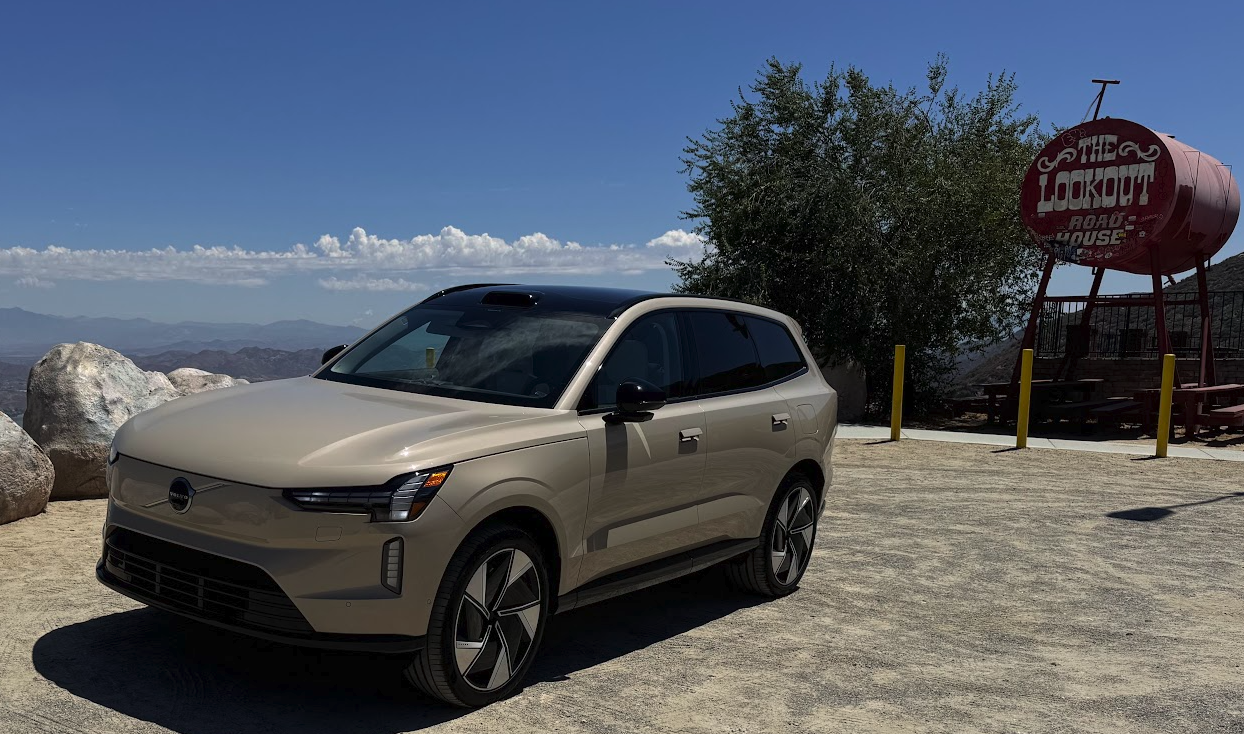
Volvo flew us to Newport Beach, California, to test its new EX90 7-seat AWD SUV. For many people, including my family, this is the holy grail of EVs. It is part electric luxury sports sedan, part four-wheel-drive off-roader and trailer hauler, and most importantly, part minivan.
How well do these come together? Let’s see…
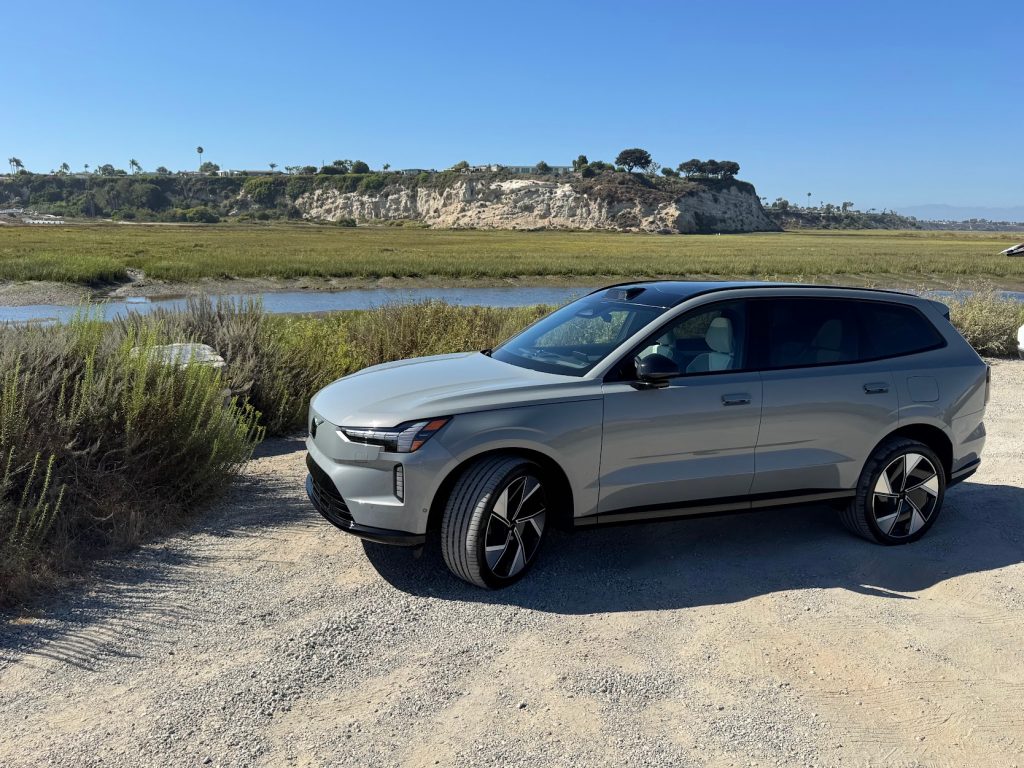
Volvo EX90 appearance
The EX90 is unmistakenly a Volvo with the signature electric closed grill at the front and Thor’s hammer headlights. The rear is more subdued and could be mistaken for a traditional Volvo XC90 or similar. The vehicles they had us in were either sandstone tan or gray which felt stately but muted.
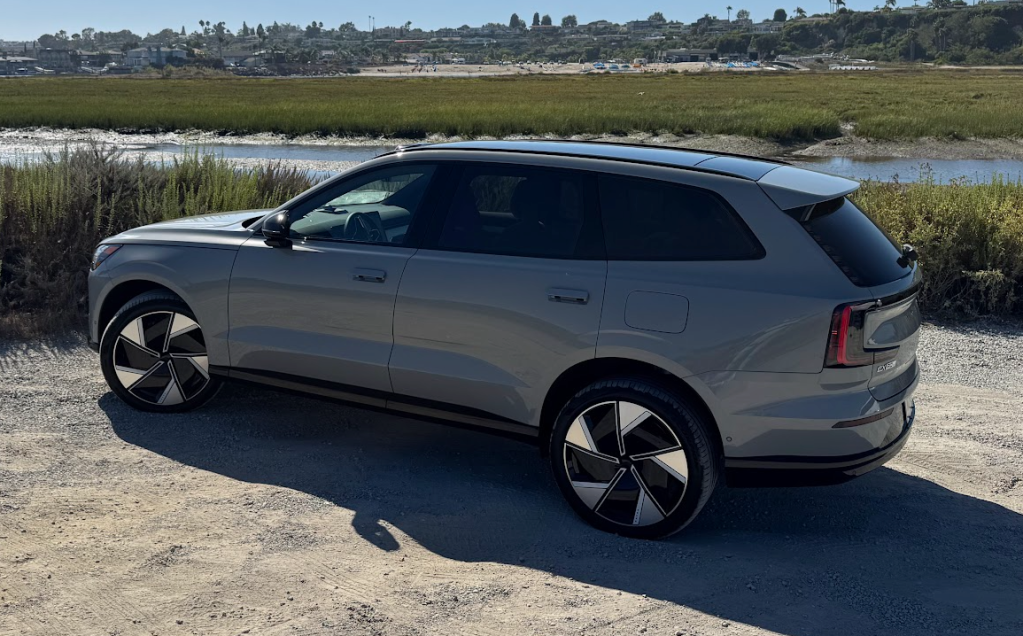
The front hump at the top of the windshield may seem like it is paying homage to London taxis or stealth police vehicles, but it is, in fact, the housing for Volvo’s very high-tech Lidar safety and eventually self-driving system.

There’s also a “Volvo for Life” tagline underneath, proudly displaying Volvo’s commitment to safety. Is it a little much? Perhaps.
Volvo, more than any other carmaker, is proud of its safety features and seems to want to show them off rather than hide them. See also: those yellow 3-point seat belts in other models, which the company invented and shared freely with the rest of the industry. They’ve saved countless lives, and Volvo expects its Lidar system to do the same.
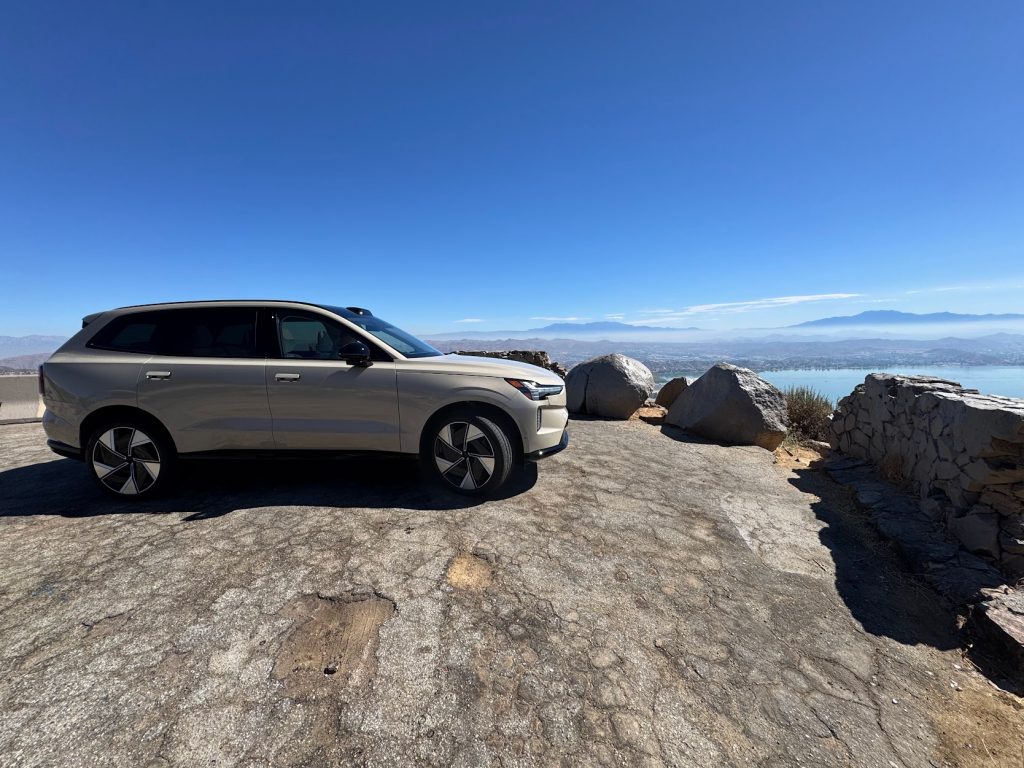


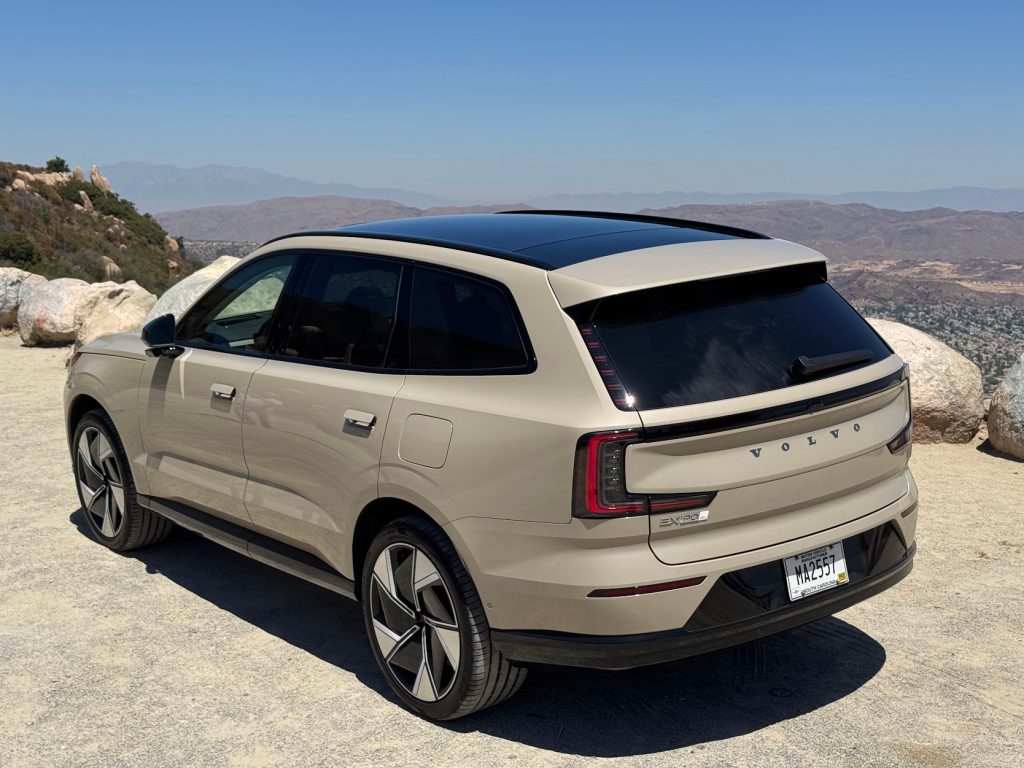

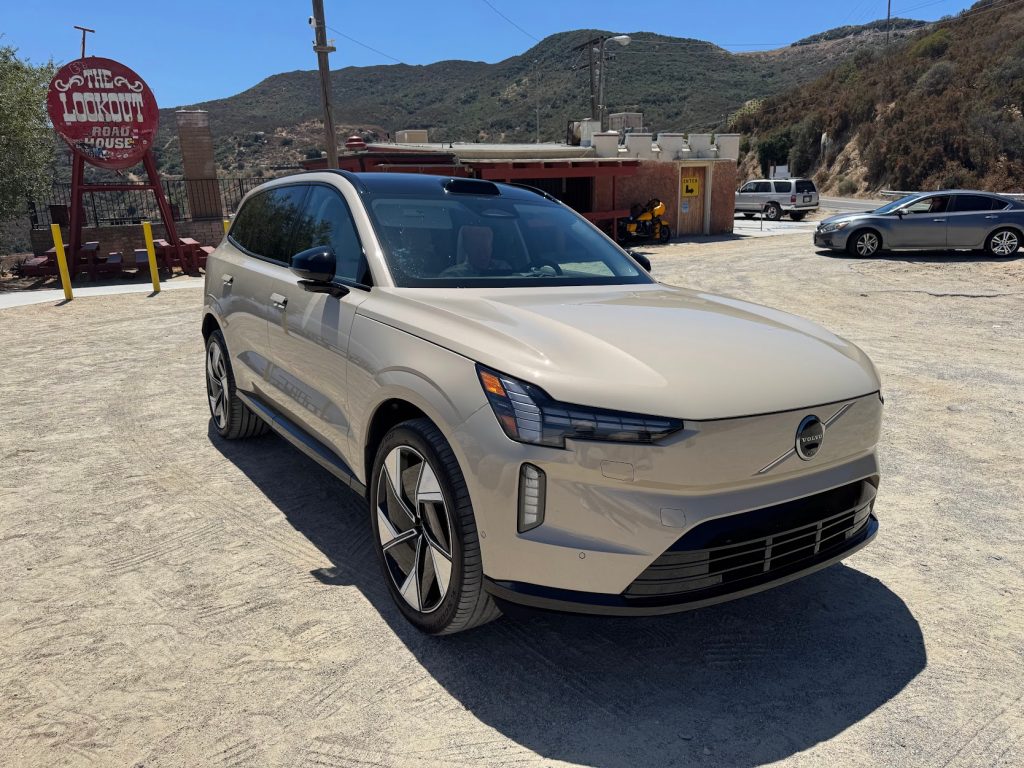
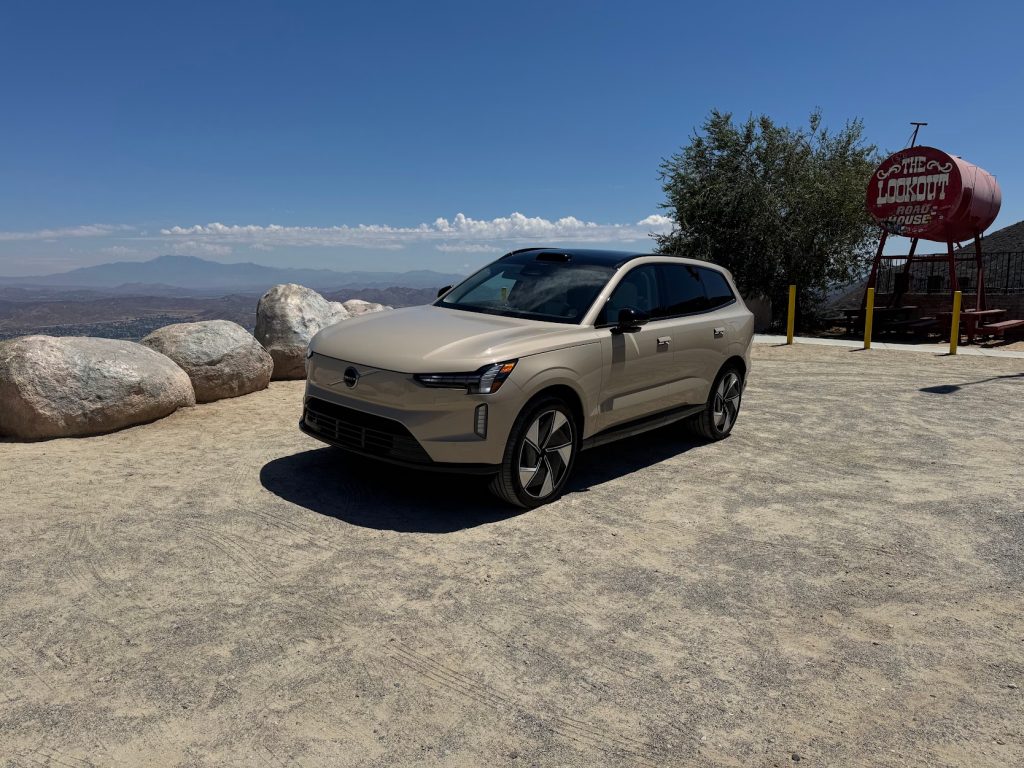
I think the EX90 has the perfect stance between sedan and SUV, allowing for a good ride height for visibility and mild off-roading but not so far off the ground that handling and turns are too compromised.
High marks all around on outward appearance. But is the EX90 just good looks on the outside? Let’s look inward.
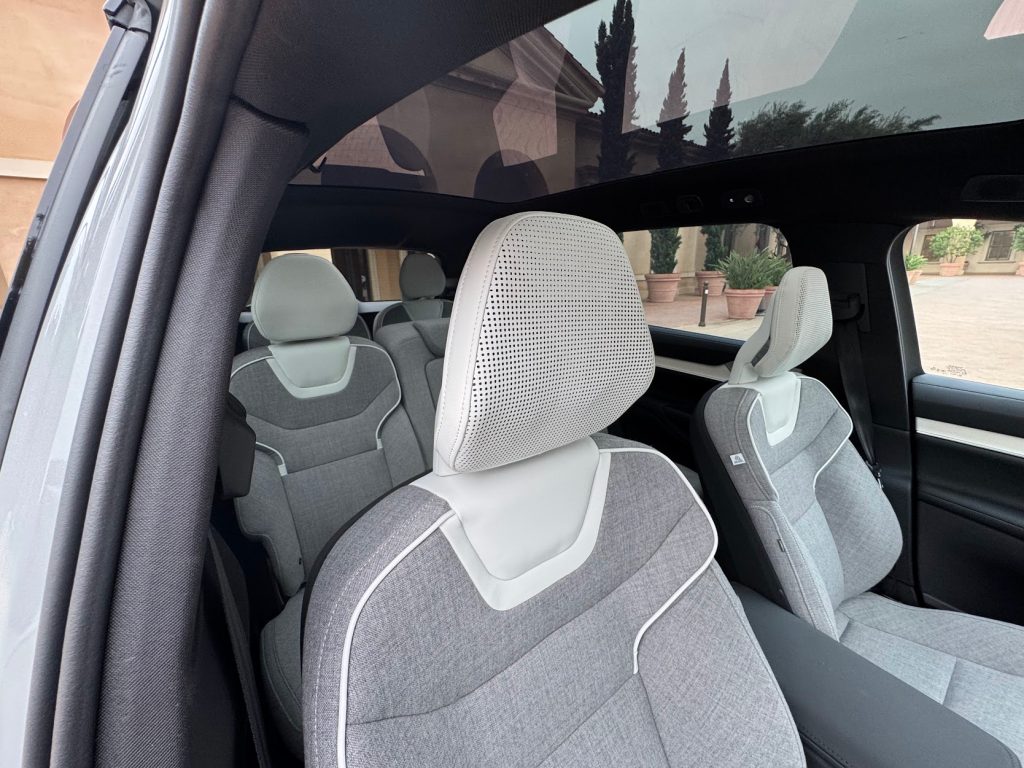
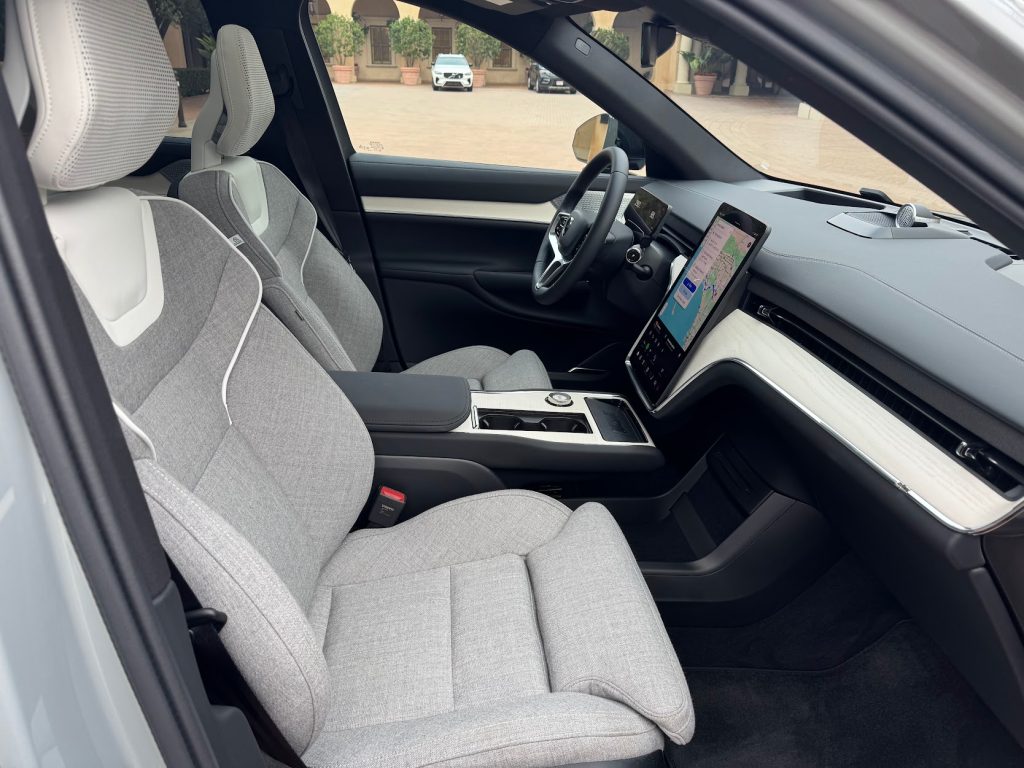

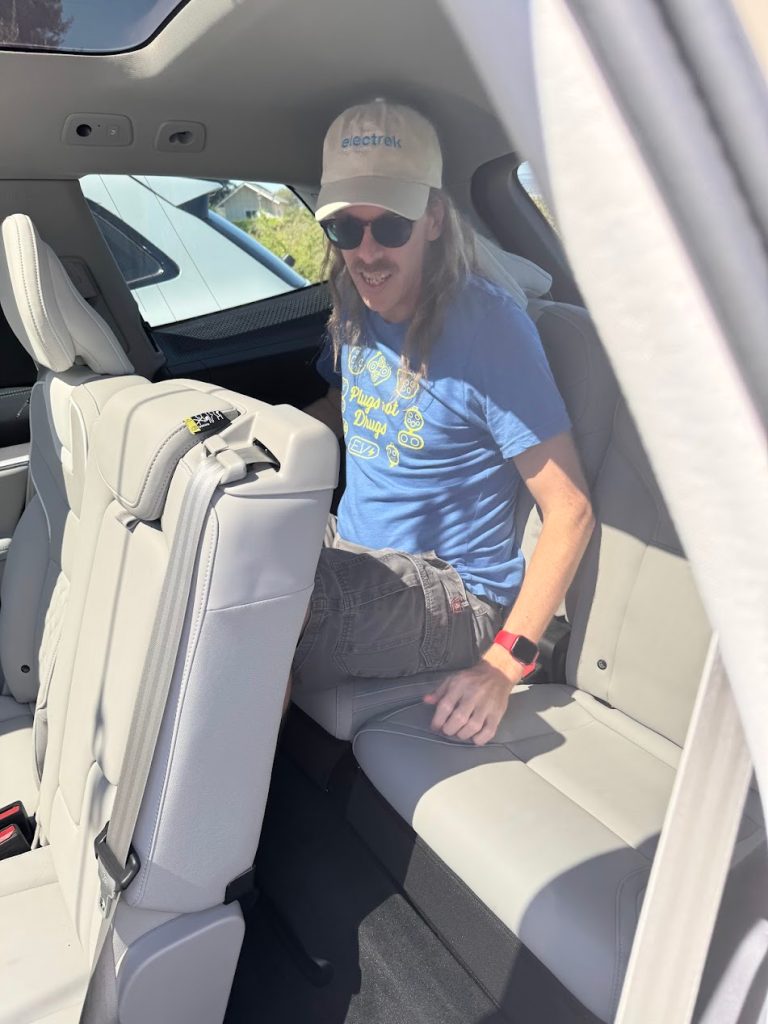
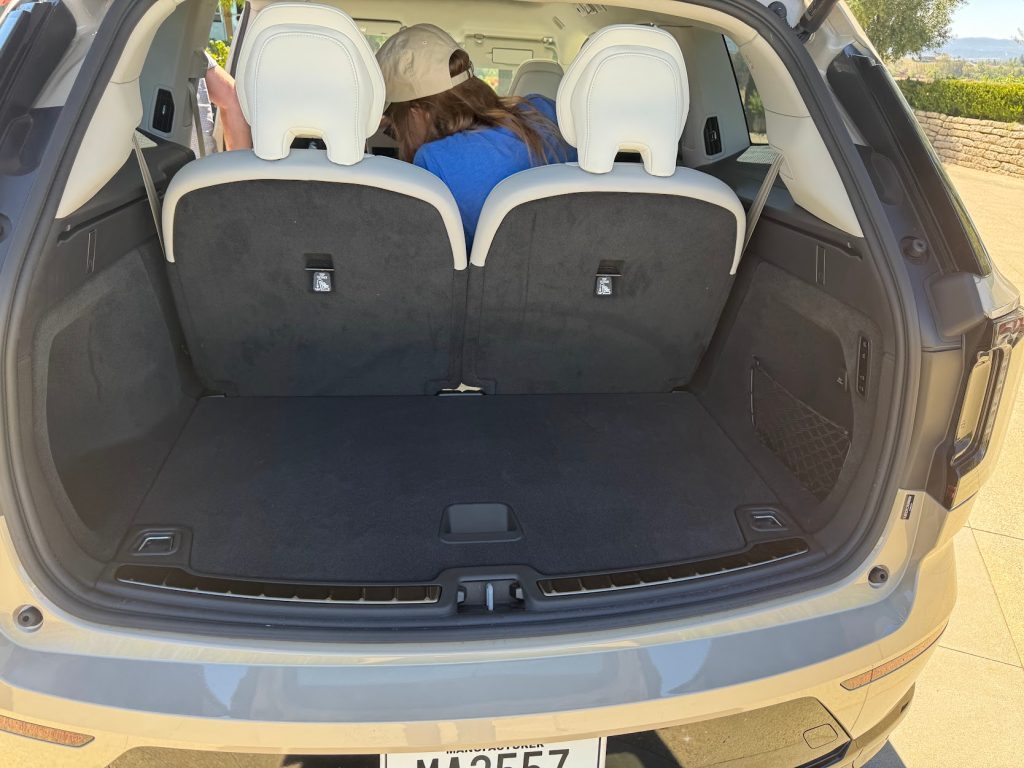
We got to sit in two different interiors, a synthetic leather and recycled cloth. Both exuded Volvo’s spartan luxury feel – not cluttered at all but also not Tesla minimalist either. The four main seats were more than comfortable in over three hours of driving and, my word, this vehicle is quiet and smooth. If you aren’t driving, prepare to nod off.
The third row is a little bit of a compromise and you can probably see why the Polestar 3, built on this same platform, only comes in a 5-seat configuration. Jamie at about 6′ tall found it to be quite uncomfortable unless moving the middle row seats up. This would be mostly for children or quick airport or school runs, not for seven adults on a road trip. We later got to see the 6-seat configuration with two middle row captain’s chairs (including armrests ahem Tesla Model X) which made the 3rd row significantly less cramped. I think the 6-seat option is where I’d go on this car.
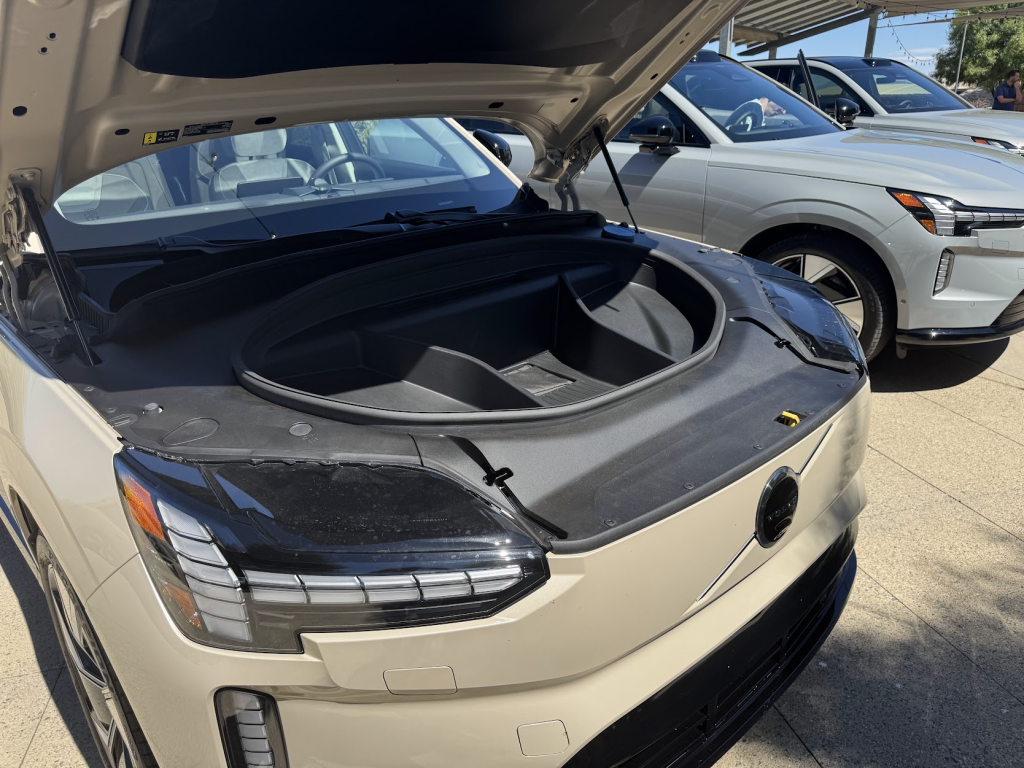
Even with the 3rd row seats up you have two rows of grocery room in the back and there’s room under the false floor for more permanent items. It is a good thing too because the “frunk” is small and hard to get to (boo!). We’d like to see some smarter packaging up front to enable a deeper, more accessible frunk.
With the 3rd row down, you’ve got some massive storage space and still room for 5 people.
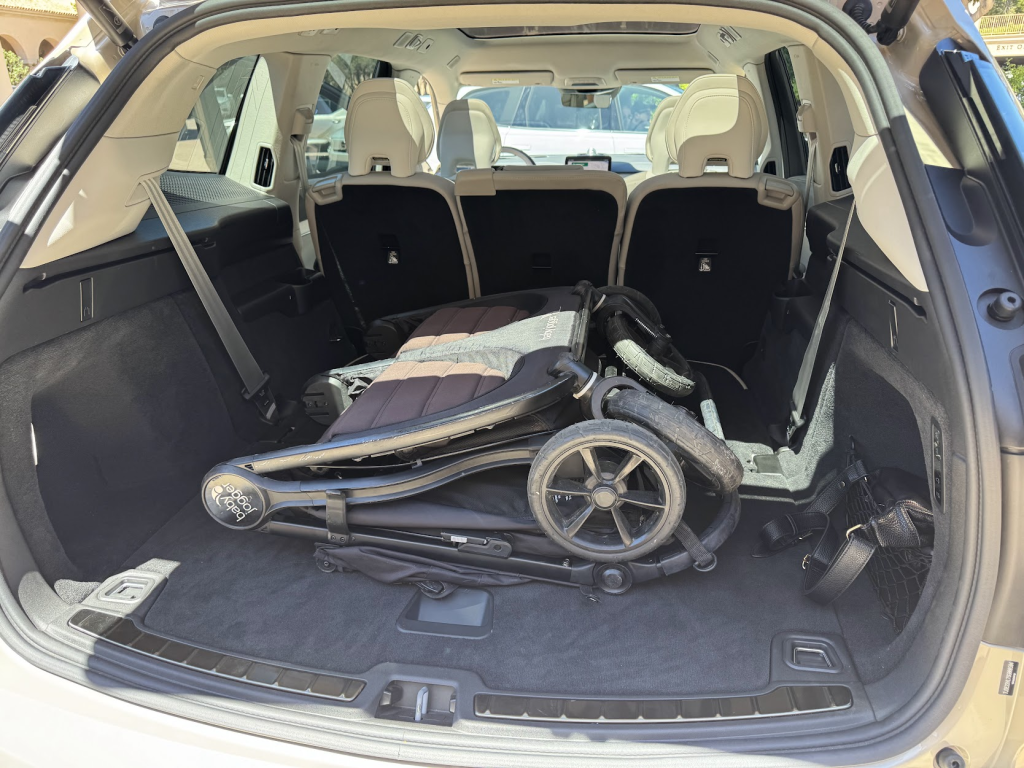
About that second-row middle seat, though: It sits higher, is firmer/less comfortable with a folded armrest in your back, and, to me, is another reason to go with the 6-seat configuration.
The EX90 center stack runs on Android for Automotive, which means you will get a very Google-centric experience. That, in my usage, is fantastic. Volvo, unlike some other automakers, decided to keep access to Apple’s wireless CarPlay open so that you can run iOS over Google’s OS. Many folks will just use the built-in Google Maps, which also shows up on the fantastic heads-up display. Google’s OS has many, if not all, of the apps you’d use on your iPhone, so it becomes a little bit redundant, but Volvo was adamant about giving their customers a choice here.
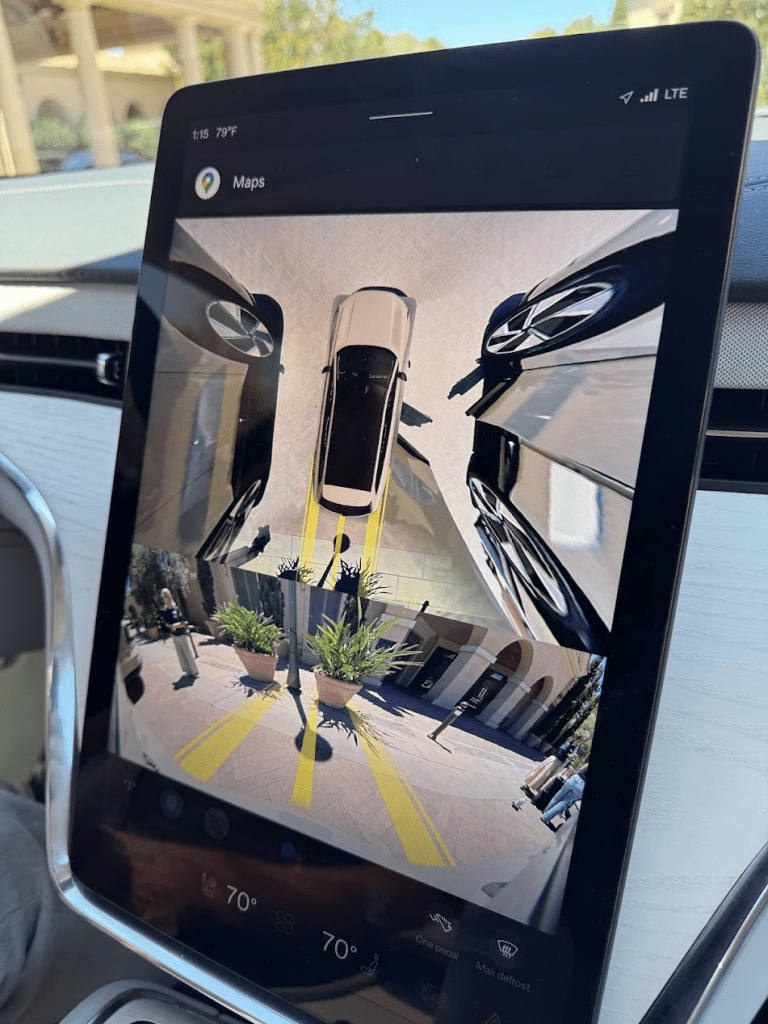
The 360 camera was solid all around but sometimes made for some interesting interpreted obstacles (see above). Overall, however, it was certainly helpful in navigating close and unfamiliar territory.
The Volvo EX90 Drive
The most unique aspect of the car was the drive performance, and it was certainly rewarding. With its electric motors and insulated interior, the drive was the quietest I can remember taking in recent years. Add to that the smooth, vibration-free feel of the road, comfy and vented seats, and the fantastic assisted handling, and it felt like a $100K+ Mercedes to drive. Torque vectoring brings incredible ease and confidence to curves. Great visibility is confidence-inspiring and inspiring, as is that Lidar-enhanced safety suite.
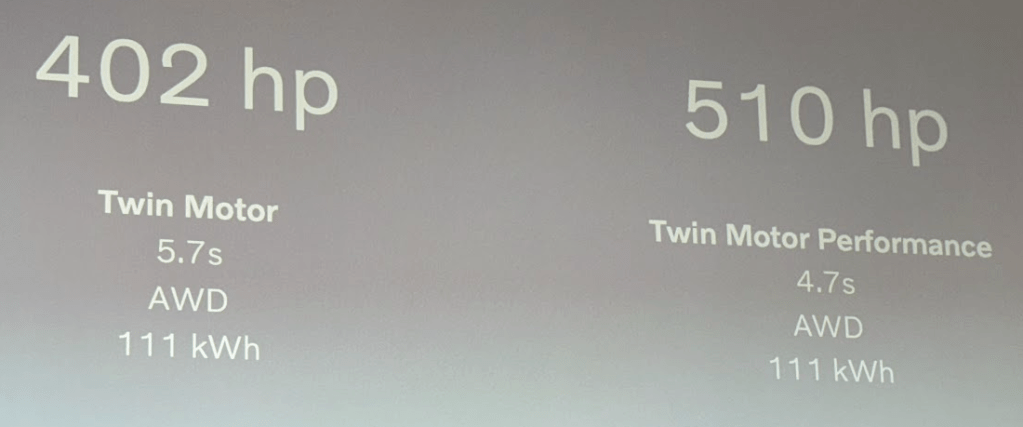
However, the performance of the motors was somewhat muted. Talking to engineers at the event, they admitted that they softened the acceleration on purpose here, though it isn’t certain if it was for drive quality, keeping parts from wear, or what. Jamie and I both railed on them, noting that their half-the-price EX30 is somehow over a second quicker to 60mph, and it is a better experience to have your foot deciding the speed, not some computer algorithms.
Still, 4.7 seconds 0-60 is respectable, and the Polestar 3, which is the same SPA platform drivetrain (slightly higher 517 hp), is only .2 seconds faster. I think Volvo could do better here but whenever I talk about speed, Volvo comes back with “safety” and I guess I get it.
Depending on what tire size you pick, the EX90 will get you somewhere north of 300 miles of range, which I think is the sweet spot for vehicles like this. Rivian’s R1S offers more range but at much bigger battery/higher price points. Tesla Model X offers more range on paper, but in reality, is often less than 300 miles. Kia’s EV9 is going to be similar.
Bidirectional Charging is a big hit
While this will go under the Lidar (lol) for some, Volvo really amped up the vehicle’s ability to power homes. Rather than the ~2kW many cars have, the Volvo can put out up to 20kW of power, meaning houses connected to the Volvo will even be able to be heated and cooled electrically. Here’s a quick demo of some use cases with a DCBEL system connected to the EX90:
Our fast charging experience was lackluster because we were on a busy Electrify America station but we still got a 185kW output with 30% state of charge. Volvo tells us that we can expect speeds up to and over 250kW at the right stations and it takes about 30 mins to take the battery from 10 to 80% or add about 210 miles.
Volvo EX90 wrap up
Volvo’s South Carolina-built EX90 is a big win in my book. Historically, the Rivian R1S and Tesla’s Model X have owned the third-row EV space. Recent newcomers like the Mercedes EQS SUV/BMW iX/Audi Q8 and, on the value end, the Kia EV9 have shaken up the market a bit. But I love the Volvo EX90 because it blends performance, style, luxury, and ride really well. Priced from $80-90K based on trim and before incentives, it is going to be a popular option in this growing space.
There’s no better test of a vehicle than the “Do I want one?” test. Often after reviewing a car, I’m happy to give it back. In this case the EX90 is something I’m following up on and therefore a big win. As a Rivian R1S owner, I often ask myself if I really need a 3-second 0-60, crazy offroading skills, or the last 100 miles of range, which I almost never use. I’d love captain’s chairs in the 2nd row (though I’d miss the fold flat). Most of all, I’d love the smoother, quieter ride and, most of all, the enhanced safety features that the EX90 offers. Like they say, it is all about safety.
